Description
Many more Genesis items for sale, please perform a search www.yperano.com :














We Can’t Dance, recorded and released in 1991, is the 14th studio album by Genesis. Although, on CD and Cassette, its a single album, on vinyl, its a double album. It reached #1 in the UK, where it remained in the charts for 61 weeks. It was their last studio album featuring vocalist/drummer Phil Collins, who would leave Genesis amicably in 1996 to focus on Dance into the Light and the subsequent tour.
We Can’t Dance was Genesis’ first studio album in five years, following the international success of Invisible Touch in 1986. We Can’t Dance reached #1 in the UK and #4 in the US, selling several million copies (including 4 million in the US alone). The album also spawned several hit singles, including “No Son of Mine”, “Hold on My Heart”, “I Can’t Dance” and “Jesus He Knows Me”, the latter two supported by humorous videos. Two songs were cut from the album, due to the fact “there wasn’t enough room on the record.” These two songs are “On the Shoreline”, and “Hearts on Fire”. Both songs were released as B-Sides.
Contrary to popular belief, “Since I Lost You” is not about a broken relationship. The lyrics were written by Phil Collins for friend Eric Clapton. On 20 March 1991, Claptons four-year-old son Conor died after falling from the 53rd-story window of his mothers friends New York City apartment, landing on the roof of an adjacent four-story building. Phil played it to him before putting it on the album to get his O.K. At the same time Eric played Phil “Tears in Heaven”.
Most of the songs were created/written by improvisation at Genesis’ Fisher Lane Farm (“The Farm”) studio.
Following the release of the album Genesis spent 13 weeks on the road playing 55 concerts between May and July 1992, with a 15 date UK tour in October/November.
Track listing:
All songs by Tony Banks, Phil Collins and Mike Rutherford.
LP
Side One
“No Son of Mine” 6:39
“Jesus He Knows Me” 4:16
“Driving the Last Spike” 10:08
Side Two
“I Can’t Dance” 4:01
“Never a Time” 3:50
“Dreaming While You Sleep” 7:16
Side Three
“Tell Me Why” 4:58
“Living Forever” 5:41
“Hold on My Heart” 4:37
Side Four
“Way of the World” 5:38
“Since I Lost You” 4:09
“Fading Lights” 10:16
Phil Collins – vocals, drums, percussion
Tony Banks – keyboards, backing vocals
Mike Rutherford – guitars, bass guitar, backing vocals
Genesis – “We Can’t Dance” (1991)
Another Chance Hello …
1991 became an important year for Genesis. The band met again in spring to record a new album. The hype around Phil Collins’ solo album …But Seriously and the accompanying world tour was slowly ebbing off. Mike & The Mechanics as well as Tony Banks hurried to release their albums that spring, and things grew hectic in Peter Gabriel’s corner, too.
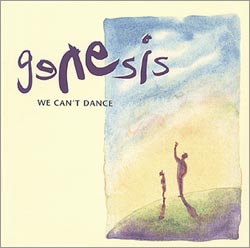 We Can’t Dance was released late in 1991 and became the most successful Genesis album so far. It topped the German album charts in 1991 and 1992 for 24 weeks and sold more than three million times in Germany alone. Sales numbers in the tens of millions, a stadium tour, lots of hit singles and entertainingly funny promo videos – yes, Genesis were a big marketing machine in the early 90s sponsored by Volkswagen. Behind the façade of a couple of musicians out of reach who had found the key to making it very big there is a varied album that was to become their last studio record with Phil Collins.
We Can’t Dance was released late in 1991 and became the most successful Genesis album so far. It topped the German album charts in 1991 and 1992 for 24 weeks and sold more than three million times in Germany alone. Sales numbers in the tens of millions, a stadium tour, lots of hit singles and entertainingly funny promo videos – yes, Genesis were a big marketing machine in the early 90s sponsored by Volkswagen. Behind the façade of a couple of musicians out of reach who had found the key to making it very big there is a varied album that was to become their last studio record with Phil Collins.
We Can’t Dance contains way over 70 minutes of music and if you are going to buy this album opt for the double LP version.
The album was produced by Nick Davis who had previously also worked on Tony Banks’ album Still. Nick Davis brought a breath of fresh air into the production. The sound of Invisible Touch had become a thing of the past. The band also broke new ground in the artwork. While the covers of previous album had been occasionally called boring, We Can’t Dance was illustrated by water-colour paintings, and once again there is no show of the band on the cover.
 No Son Of Mine
No Son Of Mine
The first song is pure mainstream. No Son Of Mine has a good reputation with the fans, too, but this song as the first single definitely paved the way for this album to become a megaseller. The sound is massive, emotional, the drums play a big role – Genesis are back, but with a sound different from Invisible Touch. The ticking of the clocks at the start of the album has something mystical, perhaps also a something of a countdown. As the drama builds around their warm new sound Genesis seem mature, calm and determined. At six and a half minutes the song is usually considered too long as a single, but No Son Of Mine repeated the trick of Mama, which was also “too long”, and still became a hit single – even in North America. In 2008 Phil described this song as the best Genesis song along with Los Endos because he was very happy with the drumming, particularly with the precision he had achieved.
 Jesus He Knows Me
Jesus He Knows Me
The album’s fourth single became another big hit. Jesus He Knows Me breaks away from the dark seriousness of the album opener. It is a straight song and a pure satire. Phil Collins hilariously mocks the American phenomenon of TV evangelists. Some more guitar elements could perhaps have improved the song. Jesus He Knows Me is another fun song from the Collins era alongside Anything She Does or Illegal Alien.
 Driving The Last Spike
Driving The Last Spike
Genesis teach us a bit of history. Driving The Last Spike is a story about the building of the English railways and the working conditions told from a worker’s perspective. The structure resembles No Son Of Mine, but it soon shows that Genesis go a couple of steps further. Driving The Last Spike is ten minutes long, which makes it another one in the tradition of Genesis long songs. The band dispenses with an extensive instrumental, though. The first half of the song follow the classic pattern of verse and chorus before it picks up speed around the middle, the instrumentation becomes intenser and the song grows more and more dramatic. Driving The Last Spike is an absolute highlight on the album. A promo CD given out by Genesis’ tour sponsor Volkswagen offers an interesting edit of the song. The shorter version could even have worked as a single. The lyrics are Phil Collins’ once more, and it is worth noting that Collins wrote some very good lyrics for We Can’t Dance.
 I Can’t Dance
I Can’t Dance
This is probably the biggest surprise on the album. I Can’t Dance is a minimalist song that thrives on a guitar riff like rarely a Genesis song has done before. The lyrics are banal, the vocals different and the keyboard sound peculiar. What sounded like a bad joke at first turned out to be the second single and a huge world-wide hit that triggered a real hype. The video for the song became a favourite even on MTV, and Genesis set out to conquer the world. It is not a very popular song with the fans, but to be fair it has to be said that I Can’t Dance offers variety the way Keep It Dark did back then.
 Never A Time
Never A Time
It is amazing how long it took for the first ballad to surface on this album. Never A Time is a pop song that resembles It’s Gonna Get Better in places (“there was never a time to say it” / “if it’s gonna get better, it starts with a feeling”). It is somewhere between nice and inconsequential, and one could have done without it on the album. In the end, however, it was released as the sixth single of the album.
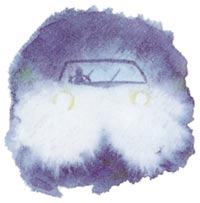 Dreaming While You Sleep
Dreaming While You Sleep
Dreaming While You Sleep is one of the tracks that does not have Collins’ lyrics – this time the author is Mike. It is about hit-and-run driving. Musically it is another highlight on the album. The drum computer sets a dark mood, the exchange of keyboards and guitars that was already excellent in Driving The Last Spike is perfected in this song. It is a real stunner when the real drums come in, the vocals are intense and the finale chillingly good. This song proves if proof were needed that Genesis still could put out come high-class stuff in 1991.
 Tell Me Why
Tell Me Why
A typical pop song trying to make the world a better place, that is what Tell Me Why is. Both these aspects invite the comparison to Collins’ solo works, the influence of which cannot be denied in this song. Only the sound is closer to Genesis than to Collins solo. Tell Me Why is not very spectacular but it was nevertheless chosen to become the fifth single. Like Never A Time, Tell Me Why would not play a role in the live set.
 Hold On My Heart
Hold On My Heart
In 1991 it was a ballad, a typical Banks song and perhaps a resting point on the album. Later it turned into a symbol of the Collins pop era with the “old” fans. Regarding this song in an unbiased way became increasingly difficult because of that. When Genesis chose to release Hold On My Heart of all songs as the third single (and when it turned into a hit) they proved that Genesis and their hit singles had nothing to do at all with the fancult.
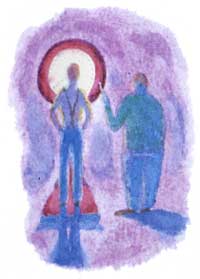 Living Forever
Living Forever
Tony Banks contributed the lyrics to this song. This time it is about the diet and wellness hype. Living Forever, which was included in the No Son Of Mine single, is an uptempo rock song that should have been just a bit more aggressive. The vocals are excellent, so is the cooperation between keyboards and guitars, but the big highlight is the closing section when for the first time on the album Genesis embark on a full-blown instrumental part that can hold its own with their other instrumentals. They have still got what it takes!
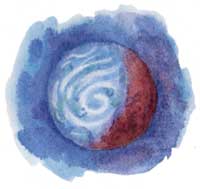 Way Of The World
Way Of The World
This is a typical Genesis pop song. The band apparently considered this one for the live shows for quite a long time, but it is a bit too unspectacular. There is actually not much to say about it: Nice tune, it fits quite well on the album sound-wise, but it would not have been a big loss if Way Of The World had been released as a B-side only.

Since I Lost You
Since I Lost You is a thorn in many a fan’s side because it gets too close to Phil’s solo music, even though Phil had not yet recorded a ballad in this style at the time. It is a band song with a serious background. While Genesis were writing and recording We Can’t Dance Eric Clapton’s son Conor tragically fell out of a window and suffered fatal injuries. Phil wrote the lyrics and the whole band wrote the music in a jam session. It may not be a musical highlight, but because of the events at that time it is legitimate.

Fading Lights
There can be no doubt that Genesis have never forgotten in all these years where they actually came from. Every album has the typical Genesis style. Living Forever brought up the topic, but it is Fading Lights that is not only a thoughtful retrospective onto a long and successful career but also and much more so a declaration of love for progressive rock. Fading Lights actually achieves the impossible spanning the arc from the early 70s to We Can’t Dance. The instrumental section in the middle is among the best and even prog fans who usually avoid the Collins era get a lot of joy from this song. And there is something prophetical in Fading Lights – Tony Banks wrote this song, as it were, about the end of Genesis …
The songs beg the question why they chose such a dull album title. There must have been lots of better choices. We Can’t Dance is not only a colourful mix of pop songs and rock epics. It showcases perfectly what is possible in the musical space between drums, keyboards and guitars. It has been produced with a sophisticated warm sound that is sometimes dreamy and melancholic or driving and rocking. Banks’ ballad Hold On My Heart has ticked off most fans while the grand finale, Fading Lights, is revered by the staunchest prog purists. In between are songs such as Living Forever and Driving The Last Spike, songs only Genesis can write. Dreaming While You Sleep illustrates how Genesis could have sounded in a future with Collins but of course things went in a different direction. We Can’t Dance is not a huge classic like Selling England By The Pound, but it shows how mature their music is. It is the perfect production by an experienced band who can get together and spontaneously record an album. We Can’t Dance is certainly underrated. When Fading Lights ends one realises it cannot get any more perfect. And this is how the chapter “Phil Collins” in the book of Genesis ends … for the time being.
When Genesis entered the studio to record their 14th studio album in the spring of 1991, they were coming off their biggest commercial success — and headed for a major change.
The band’s previous LP, 1986’s Invisible Touch, set a new sales record for the venerable act, racking up more than six million copies in the U.S. alone and sending an incredible five hit singles — including the No. 1 title track — into the Billboard Top 5. At this point, each member of the trio was actively pursuing a solo career, and the years immediately after Invisible Touch saw frontman Phil Collins and guitarist/bassist Mike Rutherford both score major hits with side projects, but after clearing their calendars of outside obligations, they got back to business.
Perhaps unsurprisingly, given that they’d started spreading themselves a little thinner creatively, the members of the band weren’t exactly working with a stockpile of new material when they reconvened. “We started this album with absolutely nothing,” Collins told Music Connection. “No vocal ideas, no musical ideas, nothing. It was just us going into the studio and improvising our way around. There are no rules.”
That might sound like a somewhat daunting way of working on a new album — especially when you’re one of the biggest rock bands on the planet — but as keyboardist Tony Banks pointed out, starting from a blank canvas had its advantages.
“We’ve pretty much made that method a policy over the last couple of albums because we feel that’s the best way to make a record that is totally distinguishable from our solo efforts,” explained Banks. “If you start bringing in ideas – even small ideas – there’s a tendency for that person to want to kind of lead at that point, and that produces something that can be done on our solo records. So we try to keep the Genesis stuff away from all that.”
The new album, titled We Can’t Dance and released on Nov. 11, 1991 in the U.K., came together after a period of significant change for the music industry. In the years after Invisible Touch, the compact disc format skyrocketed in popularity, forever altering the way people listened to music — as well as greatly expanding the amount of music an artist could fit on a single release. For a number of acts, the CD’s longer runtime served as an unfortunate invitation to stuff a record with extra filler, but it worked in Genesis’ favour.
As the band’s pop profile rose during the ’80s, they faced increasing demand for their more streamlined, radio-friendly work, which came to dominate the public perception of their sound while eating away at album space for more of the longer, more musically adventurous stuff they’d been known for in their earlier days. With over an hour of room to work in, Genesis were able to have their cake and eat it too on We Can’t Dance; the album had no shortage of pop single material — six songs in all were released to radio, five of which broke the U.S. Top 40 — but it also made room for plenty of longer tracks. Of the 12 songs that made the 12-track LP, two (“Driving the Last Spike” and album closer “Fading Lights”) clocked in over 10 minutes.
“Historically,” Banks argued in the We Can’t Dance press kit, “our strength has always lay in being able to give ourselves a bit of room to breathe. We work well in long songs; it gives us a chance to do more instrumental work, and a chance to tell more of a story with the lyrics.”
Ultimately, We Can’t Dance continued in much the same vein as the handful of Genesis albums leading up to it, and had the distinct advantage of arriving while Collins’ dominance of pop radio was still near its peak — so while it was probably unreasonable to hope it would meet or exceed the commercial expectations set by Invisible Touch, it was obviously in line to be one of the year’s bigger releases – and it lived up to its billing, topping the charts in the U.K. and hitting No. 4 in the United States.
Unfortunately for fans, the album would also end up marking the end of an era. Genesis mounted a major tour in the wake of We Can’t Dance, lining up 70 dates throughout 1992 and later commemorating them on the (separately released) two-disc set The Way We Walk. As had been the case for a decade, they went on hiatus after the tour concluded, and Collins resumed his solo career with the release of 1993’s Both Sides — but this time, he wouldn’t return. In 1996, Collins announced his departure from the lineup, sending Genesis in a different direction … and eventually, to their demise as an active entity.
Although Collins’ growing profile as a solo artist had made Genesis’ future seem tenuous for years, it was still a blow for fans, some of whom continue to hope for new music. But if the Collins-led Genesis lineup had to eventually say farewell, at least they were able to do so with an album that honored their roots to some extent.
“At this point in time, we honestly feel that this is our best album,” Banks said of We Can’t Dance. “But we also accept the fact that we might not feel that way in a year or two. But I really do feel that this album will stand the test of time a bit better than some of the other ones.”





























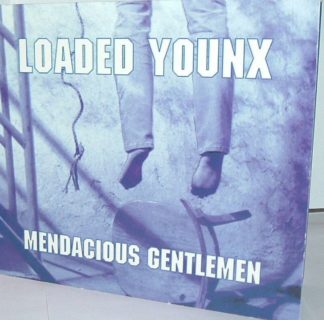

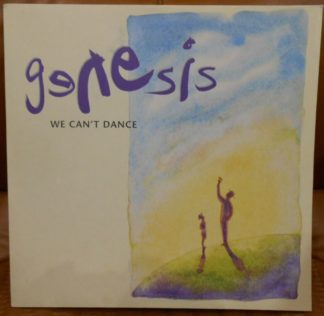


Reviews
There are no reviews yet.